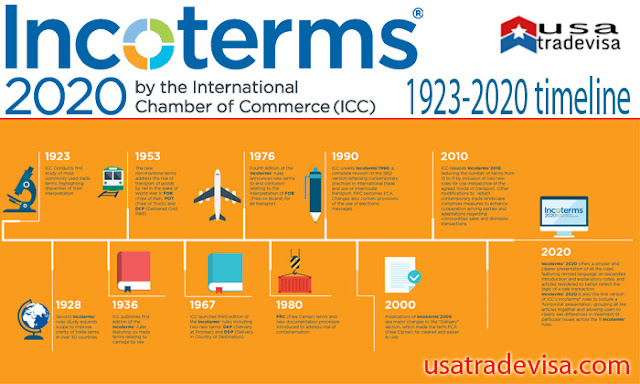FCA delivery form is divided into 2 subgroups for seaway and roadway loads. When FCA is used for shipments to be made by seaway, the exporter's responsibility for the shipment of the good ends at the port. On the other hand, printing and sending of the bill of lading, which is a valuable the document, was carried out under the responsibility of the carrier.
With Incoterms 2020, the purchasing company may request the delivery of such bills, such as the bill of lading, to the seller by the carrier, by specifying in the sales contract, although the transportation risk is at its own risk.
In Incoterms 2010 and earlier versions, the most important problem related to FCA was experienced especially in letters of credit. In multimodal transportations and especially in maritime transportations, the exporter's delivery obligation was completed before loading the export cargo to the ship. However, if a sale with letter of credit was made, the bank requested the bill of lading from the exporter and held the exporter firm responsible for the details that should be written on the bill of lading.
However, since the relationship with the seller, the exporter, the shipping company is over when the goods are delivered, he cannot intervene in the next process and was held responsible for the letter of credit reserves. This issue was addressed with the revision made in Incoterms 2020.
Incoterms 2020
Incoterms 2020 was announced by the ICC on September 10,
2019. As of January 1, 2020, Incoterms 2020 will come into force and will be
implemented. Incoterms are standards for delivery forms established by the
International Chamber of Commerce, “ICC”, which defines the responsibilities of
exporting companies and importers engaged in cross-border trade.
What's New in Incoterms 2020, What's New in Incoterms 2020?
We have listed the main differences between Incoterms® 2020
and 2010 with key topics:
FCA Related Changes:
FCA delivery term is divided into 2 subgroups for seaway and
roadway loads. When FCA is used for shipments to be made by seaway, the
exporter's responsibility for the shipment of the good ends at the port. On the other hand, printing and sending of the bill of lading, which is a valuable the document, was carried out under the responsibility of the carrier.
With
Incoterms 2020, the purchasing company may request the delivery of such bills,
such as the bill of lading, to the seller by the carrier, by specifying in the sales contract, although the transportation risk is at its own risk.
In Incoterms 2010 and earlier versions, the most important
problem related to FCA was experienced especially in letters of credit. In
multimodal transportations and especially in maritime transportations, the
exporter's delivery obligation was completed before loading the export cargo to
the ship. However, if a sale with letter of credit was made, the bank requested
the bill of lading from the exporter and held the exporter firm responsible for
the details that should be written on the bill of lading.
However, since the relationship with the seller, the
exporter, the shipping company is over when the goods are delivered, he cannot
intervene in the next process and was held responsible for the letter of credit
reserves. This issue was addressed with the revision made in Incoterms 2020.
CIF and CIP Changes:
In Incoterms 2010, insurance policies were prepared with
minimum collateral in CIF and CIP delivery forms. The current minimum insurance
level for CIF under Incoterms 2020 continues, that is, the insurance obligation
in the form of CIF delivery “Clauses (C) of the LMA / IUA Institute Cargo
Clauses”
For CIP shipments, “Clauses (A) of the Institute Cargo
Clauses”, that is, insurance, including all risks, was made compulsory.
Therefore, with the Incoterms 2020, the insurance obligation in CIP shipments
and thus the insurance responsibility of the exporter has increased.
DAT Delivery method changed to DPU:
The DAT (Delivery at Terminal) delivery term resulted in
the delivery point being a terminal, for example, a warehouse point. The DPU
was renamed "Delivered at Place Unloaded" to highlight that the
delivery point could be anywhere.
When determining the DAT point of the exporter and importer,
if this address is not a bonded area, the location should be selected, noting
that there will be no problem in terms of customs legislation in the country of
the buyer.
Transport by Truck of the Exporter or Importer:
Incoterms 2010 and earlier incoterms applications were created by accepting that the shipment will be made by a shipping company. With Incoterms 2020, companies are given the opportunity to ship abroad with their own trucks. We see that this change is regulated with reference to FCA, DAP, DPU and DDP delivery modes.
DAP and DPU: Who owns the insurance ?:
In Incoterms 2020, it is not clear whether the insurance belongs to the exporter or the importer for the DAP and DPU delivery terms. Unless otherwise stated by the sales contract or proforma invoice between the exporter and the importer company, the exporter company organizes the shipment without insurance. In this case, the importer company should question the situation and take out the insurance for the safety of the cargo and its compensation for possible damage.
More (and clearer) allocation of security requirements is included in each Incoterm rule, Incoterms® also reveals the costs incurred more clearly; The parties must verify whether this is in line with their regulations.
Clearer costs listing: All relevant Incoterms®-related costs are now listed under A9 / B9 “Allocation of Costs” to provide a single cost list.
Incoterms 2020 in terms of customs procedures:
Incoterms 2020 classifies the responsibilities of exporters and importers at the customs stage more clearly. By considering the problems and problems encountered so far, it has been clarified what the exporter and the importer are responsible for in customs procedures, considering the costs and risks for the exporter and importer companies. Another important issue was the first time in transit trade was handled with Incoterms 2020.
How to Specify Incoterms in Sales Contracts and Invoices.
Incoterms revisions are made according to the demands and needs of exporters and importers by analyzing the problems experienced in past trade transactions. Therefore, from the moment a new incoterms is published, new incoterms are expected to be used by the companies.On the other hand, using new incoterms is not mandatory. As long as the buyers and sellers specify the old incoterms number in their contracts and invoices, they can use the old versions.
For example, when a contract is prepared for an export shipment from New York to be delivered in the port of Barcelona, you can write any version of incoterms as follows.
As a rule, it is necessary to write the name of the incoterms, then the name of the destination city, and finally the date of the incoterms version:
Delivery Term: "Selected Incoterm", "Destination Port", "Incoterms revision Date"
(see options below)
- Delivery Term: CIP Barcelona incoterms 2000,
- Delivery Term: CIP Barcelona incoterms 2010,
- Delivery Term: CIP Barcelona incoterms 2020
Why use Incoterms? Why is it Necessary?
Incoterms terms set by ICC are designed to clarify exactly who owns the costs and risks associated with the transportation and delivery of merchandise.
The resolution of disputes in international trade through law is quite costly and long processes. Therefore, rules such as payment terms determined for buyers and sellers in different countries, and the clear distribution of responsibilities and risks between buyers and sellers have been determined.
What does Incoterms do?
The distribution of responsibilities and expenses listed below for the products to be shipped from a point in country A to a point in country B due to export or import are determined by incoterms.
- Is it necessary to transport in the seller's country? who will organize if necessary, who owns insurance and expenses?
- Who will organize Customs transactions in the seller's country and who owns the costs?
- Who will organize the overseas shipment, who owns the costs?
- Who owns the liability to make insurance? What is the insurance content?
- Who will organize Customs transactions in the buyer's country and who owns the costs?
Therefore, by choosing an incoterm, it should be clear at which point the responsibilities and risks will end and start between the companies.
For example, the Exporter is obliged to deliver the goods in a port requested by the Importer. The goods were brought to the port where the ship was located, but the goods were damaged as a result of an accident while loading the ship. In such a situation, the accused would accuse each other, my shipper is wrong, or my port business is wrong? The main issue is who owns the insurance liability? Such accidents are constantly happening, so be sure to use Incoterms and prepare your contracts accordingly.


















COMMENTS